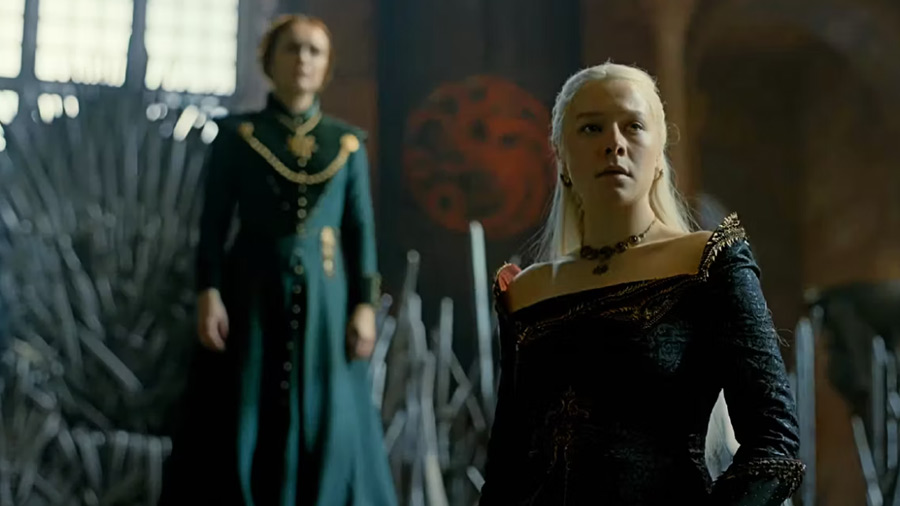When it was first announced that George RR Martin’s Fire and Blood will be turned into the first official prequel of Game of Thrones, titled House of the Dragon, the task at hand was monumental. It not only had to match up to the glory of Game of Thrones, the franchise also had to undo the sour memory of the final season of the original. House of the Dragon arrived some three years after the original and successfully expanded the franchise on screen.
Just like Game of Thrones, and anything that Martin touches, the characters are grey and their actions often questionable. That makes them believable and complex. House of the Dragon is phenomenal writing with every episode arguably being better than the one before. In some ways, the Season 1 of the prequel trumps the Season 1 of the original.
Game of Thrones explores multiple houses, their families who are all set in different geographical locations across Westeros. Dragon is largely just about the history of the Targaryens leading up to the events of the civil war. The focus is on just one House in a very specific time in their long history. This allows for more in-depth character development. In terms of the protagonist, there’s a clear one at this point: Rhaenyra. Everything that happens in the season, happens either to support her on her journey to be Queen or stop her. By that logic it should be a very binary exercise to decide which characters are ‘good’ and which aren’t. But even within that scope, the show — and by extension, its characters — doesn’t commit to our moral judgements. And there lies the brilliance in writing.
Just take a look at the two ‘good’ characters: the ones that want Rhaenyra to be Queen. They’re full of contradictions too.
Viserys I, the King, has to name an heir but is yet to have a son. His only child to wife Aemma is Rhaenyra, a girl — who, even in a world where dragons exist, cannot sit on the throne. After repeated attempts, Viserys finally gets a glimpse of hope. He may have a son but in order for the birth to be successful, he will have to agree to a procedure which will definitely kill his beloved wife. Viserys is driven by prophecies and dreams. He believes he will have a son. So he trades a wife for a son. Unfortunately, the baby dies within hours. Viserys has blood on his hands. He has lost both his wife, who he loved dearly, and his son, who he believed would be King. Out of desperation and newfound wisdom, Viserys names Rhaenyra — to everyone’s shock — his heir. For the rest of the season, Viserys carries the guilt of having killed Aemma. This transforms him and he stands by Rhaenyra, even in the toughest of times. When the whole court challenges Rhaenyra, it’s Viserys, the father, who supports his daughter. The tags of ‘king’ and ‘heir’ become less important then. While it’s easy to idolise Viserys in the later seasons, one mustn’t forget how his transformation started in the first place.
Greyness in characters isn’t just created by great writing but also with nuances in acting
Daemon Targaryen, the brother of Viserys I, is in a complicated position. Prior to Rhaenyra being named heir, no woman had ever sat on the throne. The obvious choice for an heir was — while Viserys remained without a son — Daemon. However, Viserys’s reluctance to accept him as heir created a tension between the brothers. Daemon — now the internet’s boyfriend thanks to the exceptional portrayal by Matt Smith — is the ‘rogue prince’, Martin’s favourite character. His moral compass may not align to ours. He has an affair while he’s still married, kills his first wife, disobeys the king, kills people without a fair trial, conspires to fake the death of Laenor (Rhaenyra’s first husband) and is dangerously impulsive among other things.
You never know what Daemon is up to next. He could be fighting for you or against you. But behind all this is a man who truly loves and respects his brother and has genuinely fallen in love with Rhaenyra (For the uninitiated, yes, Targaryens are incests!). He picks up the crown of the older brother, when it falls off the head and supports him as he struggles to climb up the throne; he bends the knee to his wife — Rhaenyra — and hails her as the Queen, ready to start a civil war for her.
Greyness in characters isn’t just created by great writing (of course, that’s the foundation of it) but also with nuances in acting. Paddy Considine’s Viserys angered us when he chose to risk the life of Aemma for an unborn son, relying on his vision. But moments later, the actor’s shift in expressions added to the duality written on paper. His ambitions snatched what he loved the most. And the way he silently stands by the bodies of his wife and son allows the audience to see his guilt. Viserys messed up. He realises it slowly. Considine’s acting elevates it. And moments later, as Viserys names Rhaenyra the heir to his throne with hope in his eyes, we’re with him once again.
Good grey characters without the support of good actors are just uneven characters. Good actors bridge the gap between the ‘morally right’ and the ‘morally wrong’ in their nuances. And Considine is a good actor. I mean, one of the best moments of the show was just him struggling to walk to the throne. Just that. He knew death was near and yet wanted to be there for his daughter one last time. He made the walk epic, memorable and one of the more emotional scenes in the season.
Morally grey characters have been seen in the milieu of the world since Game of Thrones. Jamie and Cersei Lannister are the prime examples. You go from absolutely hating them to rooting for them (more for Jamie than Cersei) in the later seasons. Same for Melisandre. The opposite becomes true for Daenerys Targaryen. You start with pity for her, end Season 1 with hope and ambition; and seasons after rooting for her to sit on the throne you hate her when she finally does (irrespective of the execution in Season 8). There’s Theon Greyjoy, who for a brief moment allowed his ambitions and greed to get the better of him. Then there are other secondary characters — the Hound, Bronn. Every character in Thrones is grey to some degree or the other. However, their grey arcs play out over the seasons. There will be seasons where you hate Cersei's actions throughout; there will be seasons where you understand her more and want her to find peace in her own way.
Dragon shows us how gaps in histories allow for greyness
Dragon's grey arcs — possibly because it covers almost 20 years in a single season — happen all within one season. Hence, as a standalone season, Dragon Season 1 becomes more impactful. Unlike Thrones, Dragon doesn’t have a twist in the pilot episode ending or the beloved protagonist doesn’t get beheaded. In terms of shock value, there are far too few. But a good show isn’t just made of plot twists and sudden deaths. The showrunners had opportunities to tweak the source material.
Game of Thrones is based on novels. Dragon is adapted from a section of a fictional history book. Fire and Blood, the source material, is told largely through historians’ perspectives. House of the Dragon shows us the in-betweens of recorded histories. These nuances of in-betweens are the creative calls of Martin along with the showrunners Ryan Condal and Miguel Sapochnik (who had earlier directed some of the most iconic Thrones episodes).
Gaps in histories allow for greyness. Aemond Targaryen, the second son to Alicent Hightower (the second wife of Viserys), is said to have chased Lucerys (Rhaenyra's second son to Laenor) off the Baratheon court on dragon back to kill him. While histories vary depending on who the narrator is, everyone seems to agree on the fact that Aemond killed Lucerys in cold blood. By these accounts, Aemond’s intentions and actions were evil — which ultimately resulted in the start of the civil war. But the show added a very small element on the largely same accounts that changed the nature of this event.
Aemond never intended to kill Lucerys. He merely wanted to bully and scare him off. But with the young riders still unable to truly understand their dragons, a tragedy was inevitable. Vhagar, Aemond's dragon, ignores his commands as she attacks Lucerys and his dragon, Arrax, once attacked (also against Lucerys's will). Vhagar's fury kills Lucerys and Arrax, while Aemond looks at the sight in shock. He never intended to kill and now that Lucerys is dead, he knows what this is going to look like. History remembers what it looked like, hence Aemond is remembered not as an idiot but as evil. And for that brief moment — a couple of seconds really — the audience feels bad for Aemond. A small shift in action line and expression changed who Aemond is to our perspective.

Princess Rhaenyra and Queen Alicent in a scene from HOTD.
More than the dragons and the war, it is a story of two mothers who used to be best friends
Among the grey characters in Dragon, Alicent is probably the more tragic one. She was the best friend and companion of Rhaenyra as teenagers. After the death of Aemma, the first wife of Viserys, she is made to mingle with Viserys by her father, Otto Hightower. Once Viserys starts enjoying her companionship and the court starts pressuring him to remarry, Alicent is married off to Viserys with little to no say from her end. In the process, she loses the warmth and friendship she shared with Rhaenyra. From best friend to stepmother. So far, Alicent is a tragic character who’s conditioned by her father to give birth to sons who could perhaps one day become kings. Alicent wants none of this but how long can one avoid generational conditioning? Alicent is a good daughter, a loyal wife and a caring mother, none of which are attributes that one could put on Rhaenyra. Alicent births sons — Aegon and Aemond, yet Viserys's decision remains unchanged: Rhaenyra will become Queen after his death; Aegon, though the first born son of Viserys, is far behind in line. Alicent’s conditioning fuels her own ambitions and hopes for her sons. And soon, Alicent becomes somewhat like her father — conditioning her son to think of a future where he's the king.
All this is made worse when Alicent misunderstands what Viserys has to say on his deathbed. Viserys was merely realising what his prophecy meant: he saw Aegon becoming the ‘prince that was promised’. Aegon in the milieu of Westeros will be a name of different characters across history. But Alicent misunderstands it thinking he’s talking about their son Aegon. Hence, she starts her plan to usurp the throne. As viewers, you don’t support her but you understand her; you feel for her. Even the last time we see her on screen in Season 1, she stands in front of her son, Aegon, to protect him from the flames of a dragon. We see a mother trying to protect her son. It’s hard to hate Alicent even when you majorly disagree with her.
This is where House of the Dragon shines. Behind every action — both good and bad — are characters trying to do something for their families; for people they love. The show is as much a family drama as it is a fantasy epic. While the scope of the world is big, the soul of the show is intimate. Its evolving relationships and their internal complexities truly ground the show. At the end of Season 1, more than the literal dragons and the upcoming war, it becomes a story of two mothers who used to be best friends — one who has put the other’s life on the line in the hope of her son becoming king; the other who is ready to avenge the death of her son at any cost.











